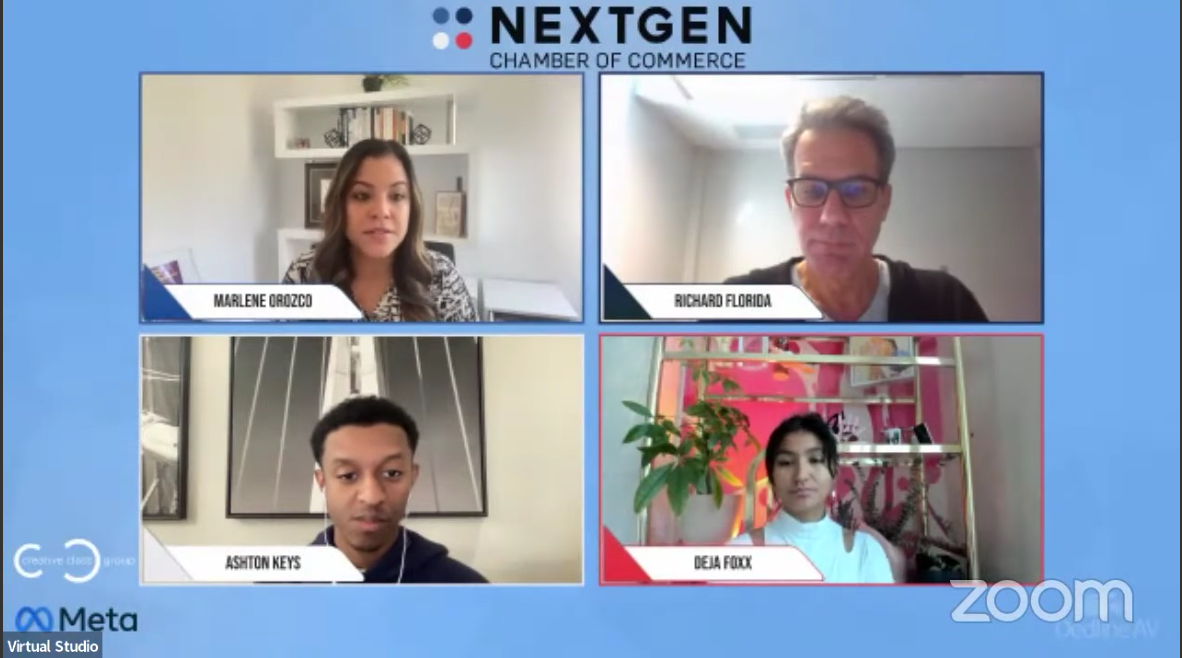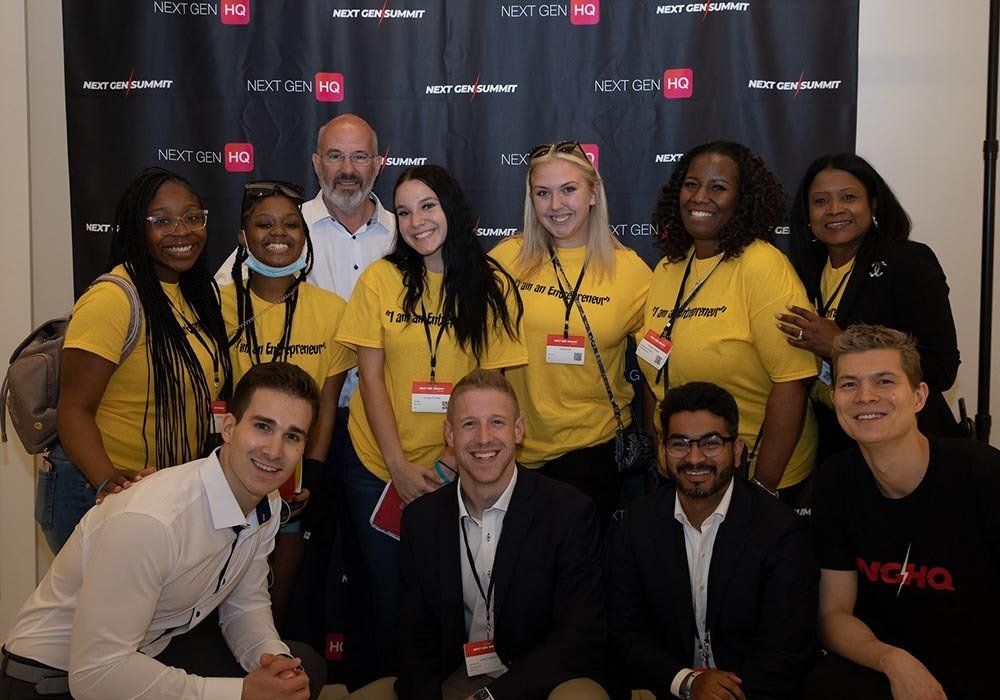Inflation Not Dampening Small Business Confidence
New Survey Research Highlighting Millennial Businesses
Inflation Not Dampening Small Business Confidence
Despite rising inflation, small business owners are feeling motivated to grow their business
While small business owners cite rising inflation as the biggest challenge they have faced in the past year, they are also feeling motivated to grow their business. These are the topline findings from a recent self-reported survey of anonymous respondents conducted by the Capital One Insights Center and Capital One Business in partnership with Morning Consult and the NextGen Chamber of Commerce. As the rate of inflation continues to rise, small business owners report feeling the impact of affordability challenges most sharply in the form of increased costs of goods and lower sale volumes, as cost-conscious consumers re-evaluate their spending habits.
Despite these inflationary pressures, small business owners' trademark optimism and intrepidness1 is evident in the self-reported survey results – they both acknowledge the challenges of inflation on their growth, but remain confident that their businesses will still be operating in the next six months. Small business owners report feeling prepared after taking proactive measures to further mitigate the negative impacts of inflation on their business. Despite this preparedness, some small business owners report several key challenges in addition to inflation.
All data from this report is self-reported from anonymous respondents across the U.S. Survey respondents included may or may not have relationships with any number of financial institutions and/or products.
Methodology
Capital One and the NextGen Chamber of Commerce partnered with Morning Consult to conduct a nationally representative, self-reported survey on the perceived challenges and opportunities that small business owners have faced two years after COVID was declared a pandemic, against the backdrop of rising affordability pressures.
The survey was conducted between March 25 – March 30, 2022 among a sample of 1,200 small business owners and 300 auto dealership owners. Small businesses are defined as those with total annual revenues of less than $20 million. The 300 auto dealership owners each own a dealership with an approximate annual sales volume of at least $1M. Gen-Zers (n=37) are defined as those born between 1997-2012, Millennials (n=434) between 1981-1996, Gen-Xers (390) between 1965-1980, and Baby Boomers (n=326) between 1946-1964.
Results from the small business owners have a margin of error of plus or minus 3 percentage points and those from the Millennial small business owners have a margin of error of plus or minus 5 percentage points.
Note: All data in this report is from self-reported, anonymous research of U.S. small business owners broadly, not specifically from or about Capital One customers or employees.
Key Findings
- Nine-in-ten small business owners are confident their business will be operating in the next six months. This level of confidence is similar across demographic groups. Despite this confidence, less than half (43%) of small business owners say business conditions2 in their area are either excellent or good.
- While confidence in their business is strong, small business owners faced a variety of challenges this past year, with inflation (48%) reported as being the biggest one. More than seven-in-ten (71%) of all small business owners and Millennial small business owners say that inflation has had a negative impact on their business in the past three months. Over three-quarters (77%) are concerned about future negative inflation impact.
- Most (76%) small business owners are confident they will be able to fill open positions in the next six months. To attract and retain new talent, small business owners who changed their hiring practices are most commonly offering more competitive wages (16%). Millennial small business owners (47%) are more likely to increase their employees’ wages than other small business owners (36%).
- But, running a small business in the past year has taken a toll on the entrepreneurs. Nearly half (42%) of small business owners say they have experienced burnout in the past month, with 24% saying they are currently experiencing burnout, a syndrome resulting from chronic stress at work that is characterized by overwhelming exhaustion, negative attitudes, or a lack of commitment with clients and dissatisfaction with job performance.
- Looking ahead, a quarter (23%) of small business owners are still mainly focused on profit growth despite the margin-tightening conditions driven by inflation. Nearly all (88%) small business owners say technology helps them run their business better and more cost effectively.
- Most small business owners report using their own savings to start (77%) or expand (50%) their business. Three-quarters of Millennial small business owners report using their own savings to start their business and just over half (52%) used their savings to expand, similarly to all other small business owners.
- Additionally, small business owners report that student loan debt has negatively impacted the ability to grow their business. Approximately a third of small business owners (30%) and Millennial small business owners (31%) who have or have had student loan debt say it impacted their ability to scale or grow their business.
Small business owners are largely optimistic despite rising inflation and other current business challenges. Despite facing challenges this past year such as perceived business condition declines in their area, rising inflation, interest rate hikes, and a tight labor market, small business owners remain optimistic.
Nine-in-ten small business owners are confident their business will be operating in the next six months. Despite this confidence, nearly half of small business owners say local business conditions are either excellent or good (43%), down from 57% in December 2021. However, 94% of auto dealership owners say they are excellent or good.
In the past year, inflation (48%), cash flow (40%), and low sales (36%) have been the biggest challenges for small business owners.3 Millennial small business owners say that inflation (48%) and cash flow (45%) are the biggest challenges. As the rate of inflation continues to climb, small business owners cite affordability pressures as their biggest struggle, with 20% saying that out of the issues they have experienced, it has been the most challenging. Inflation is closely followed by low sales (18%) and cash flow (17%).
Over three-quarters (77%) are concerned that inflation may negatively impact business performance in the next three months. Seven-in-ten (71%) small business owners say that inflation has had a negative impact on their business in the past three months, most commonly felt as an increased cost of goods and services (59%) and lower sales (23%). Dealership owners have also felt this mostly in increased costs of goods and services (23%) and increased interest rates on loans for property purchased (14%.)
Small business owners who have taken action to mitigate the potentially negative impacts of inflation say they have built up cash reserves (27%), preemptively raised prices (23%), and purchased more inventory (21%). Most small business owners (77%) are concerned about the impact of inflation in the next three months, with approximately a third feeling ‘very concerned.’ Despite small business owners’ concerns, over a third (34%) say they have not taken any actions to mitigate the effects of inflation. On the other hand, dealership owners have all taken some action to combat inflation; they have mostly invested in technology (41%), built up cash reserves (33%), and purchased more inventory (29%).
When recruiting new employees, small business owners say it has been challenging to find qualified candidates and to pay them competitive wages. While 20% say it has been challenging to hire employees in the last three months, a majority (75%) have not hired any new employees in this period. Millennial small business owners (26%) and dealership owners (73%) have found it slightly more challenging to hire. Of those small business owners who have found it challenging to hire new employees, about a third of small business owners mostly cite wages (33%) and a perceived lack of qualified candidates in their geographic area (32%) as the largest hurdles.
Those who have changed their hiring practices in the past year have most commonly been offering more competitive wages (16%) to improve recruiting. Approximately two-thirds of small business owners have not changed their hiring practices since last year.
Small business owners are confident (76%) they will be able to fill open positions in the next three months. Confidence is similar across age groups. Those with 51 employees or more are much more likely to be confident in this (88%) than those with 50 employees or less (75%).
Given the challenges small business owners have had to face this year, according to self-reported survey results, running a business during the pandemic has taken a personal toll. Twenty-four percent of small business owners say they are experiencing burnout, up from 20% in December 2021. Gen-Z (38%) and Millennial (30%) small business owners, and dealership owners (41%) are the most likely to say they are currently experiencing burnout. In addition to burnout, most small business owners feel like they are achieving less than they should (62%), feel run down and drained of physical or emotional energy (60%), do not feel support from the government as a small business (58%), and are constantly worried about their business’ finances (57%).
Student loan debt has impacted entrepreneurs’ ability to scale or grow their business (30%). According to the Ewing Marion Kauffman Foundation,4 individuals who start a business with student loan debt may have access to less capital and may need to delay business investments, which might impact growth. About half (47%) of small business owners who have student loans say that the student loan repayment, interest, and collection pause during the COVID pandemic has allowed them to invest more into their business, while a similar amount say that the pause has not had an impact (53%). Nearly all auto dealership owners (92%) say the student loan pause has allowed them to invest more into their business.
Childcare (35%) and adult caregiving (25%) responsibilities inspired some to start their own business and have largely improved their ability to manage their own time. Parent self-employment increased, according to a study by the Social Policy Institute at Washington University in St. Louis. They found that the enhanced child tax credit in the last six months of 2021 supported entrepreneurship among parents. Additionally, 48% of small business owners agree that being a parent has made them more conscious of their time management skills. Similarly, those who are caregivers (55%) also say they are more conscious of their time management skills.
While a majority plan for short- or long-term organizational goals, almost four-in-ten businesses with 50 employees or less report not planning for either. Smaller businesses are more likely to say that they do not currently outline short- or long-term goals for their organization (38%) than larger organizations (8%). This percentage grows the smaller the business, with half of those who are the sole employee in their business and over a third (37%) of those with one to four employees reporting they do not outline goals. When thinking about organizational priorities, small business owners consider profit the top metric of success (23%), closely followed by customer satisfaction (21%).
An overwhelming majority of small business owners (88%) say technology helps them run their business better. Millennial small business owners are more likely to consider themselves digitally savvy with the skills to adopt new technologies (83%) and to use digital tools to market and grow their brand (80%) than the average small business owner (75% and 73%, respectively).
Small business owners have faced a variety of challenges this past year, both personal and professional. However, they are taking necessary steps to mitigate the effects of their largest business hurdle - inflation - as well as navigating a challenging labor market. Despite past and ongoing challenges, small business owners are largely optimistic about the future of their business.
About the Capital One Insights Center
The Center combines Capital One research and partnerships to produce insights that advance equity and inclusion. As a nascent platform for data and dialogue, the Center strives to help changemakers create an inclusive society, build thriving communities and develop financial tools that enrich lives. The Center draws on Capital One’s deep market expertise and legacy of revolutionizing the credit system through the application of data, information and technology.
About Capital One Business
Capital One® offers a broad spectrum of financial products and services to consumers, small businesses, and commercial clients. Capital One Business offers a diverse suite of financial products, tools and services designed specifically for small businesses, including credit cards with unlimited rewards and banking products and services. Capital One Business is committed to fueling the courageous entrepreneurial spirit that's at the heart of American small businesses. We are focused on listening to and learning from the millions of businesses we serve every day to make sure our products, services and experiences work as hard as they do.
About the NextGen Chamber of Commerce
The NextGen Chamber of Commerce is America’s first business organization supporting our emerging entrepreneurs and business leaders under the age of 40. We want to turn the tide in favor of a new generation that has been tasked with carrying America’s economy through the 21st century. We pursue this mission by advocating for policy solutions, supporting diversity in entrepreneurship, and advancing voices to enable a new generation of business leadership to promote better capitalism.
About Morning Consult
Morning Consult is a global decision intelligence company changing how modern leaders make smarter, faster, better decisions. The company pairs its proprietary high-frequency data with applied artificial intelligence to better inform decisions on what people think and how they will act. Learn more at morningconsult.com.
______________________________________
*Note: Businesses with 51 or more employees (n=52) and Gen-Z Small Business Owners (n=37) have a sample size of less than 100.
1 According to the U.S. Chamber of Commerce’s Q1 2022 Small Business Index (SBI), the SBI score of 64.1 remains stable, with small business owners feeling generally optimistic about their day-to-day operations and expectations for the future.
2 Business conditions are defined as the factors that have an impact on business operations, such as inflation, unemployment, and regulations.
3 Ewing Marion Kauffman Foundation (2020), Student Loans and Entrepreneurship: An Overview, Entrepreneurship Issue Brief, No. 5, Kansas City, Missouri.







NextGen Chamber of Commerce | All Rights Reserved |
Created by Olive + Ash.
Managed by Olive Street Design.



